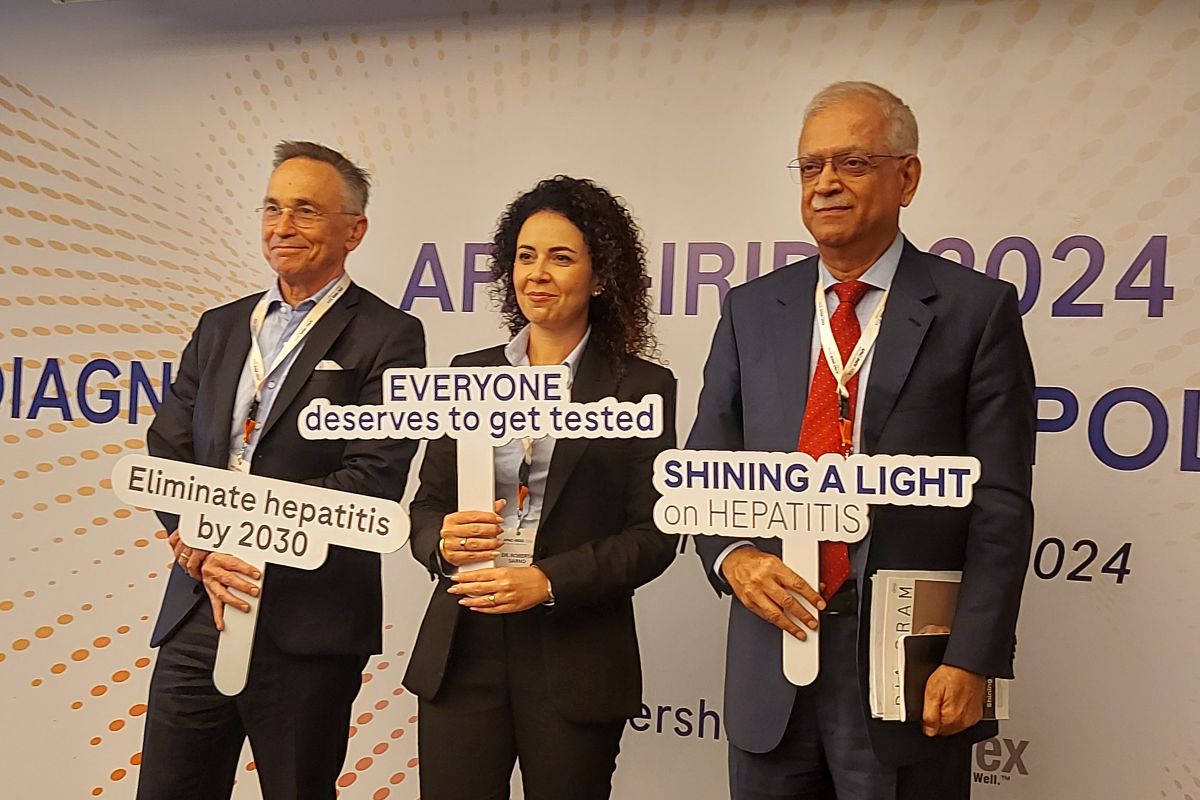According to a World Health Organization (WHO) report, as many as 304 million people are living with chronic Hepatitis B and C worldwide.
The report states that 86 percent of the 254 million recorded Hepatitis B sufferers are unaware of their illness. And, 97 percent are not receiving any treatment.
Meanwhile, 63 percent of the 50 million Hepatitis C sufferers are in the dark about being exposed to the virus, with 80 percent not undergoing any treatment.
The WHO's 2024 Global Hepatitis Report further states that hepatitis causes 1.3 million deaths every year, catching up with the number of fatalities caused by tuberculosis, the leading infectious killer globally.
On the sidelines of the Asia-Pacific International Roche Infectious Diseases Symposium (APAC-IRIDS) 2024 in Ho Chi Minh City, Vietnam, on June 20, 2024, director of the Coalition for Global Hepatitis Elimination, John Ward, said that hepatitis viruses have emerged as a major threat globally due to inadequate measures taken by most countries, especially those in the Asia-Pacific, against them.
He said that among the common stumbling blocks faced by countries worldwide in hepatitis handling are the limited sources of funding, inequitable access to detection tools, low public awareness about the importance of early detection, as well as issues related to the provision of vaccines and medicines.
Ward underscored that the absence of requisite actions could lead to a surge in the number of people infected with the viruses, which, in turn, could push up health costs in many countries and maim the productivity of hepatitis sufferers.
Hepatitis refers to the inflammation of the liver, a vital organ of the human body, which is tasked with processing nutrition, sifting blood, detoxifying, and synthesizing proteins.
It is worth noting that liver inflammation can lead to cancer.
Also speaking on the sidelines of the APAC-IRIDS, Nguyen Van Vinh Chau, chairperson of the Federation of the Associations of Infectious Diseases of Ho Chi Minh City, estimated that one out of eleven people in Vietnam is living with chronic Hepatitis B.
In Vietnam, liver cancer is the leading cause of mortality, with the annual death toll crossing 23 thousand. Worse, the number of liver cancer cases in the country has been on the rise in recent years.
Indonesia’s hepatitis challenge
The Ministry of Health has revealed that over 20 million Indonesian citizens are suffering from hepatitis, with Hepatitis B sufferers dominating the number.
Since 2016, Hepatitis B has caused 51,100 deaths every year, while Hepatitis C has been responsible for the deaths of 5,942 people annually.
According to data released by state health insurer BPJS Kesehatan, in 2022, as many as 2,159 people succumbed to cirrhosis and liver cancer, which constitute the worsened states of Hepatitis B.
A hepatologist from Cipto Mangunkusumo National Hospital, Andri Sanityoso Sulaiman, who also attended APAC-IRIDS 2024, observed that the actual numbers could be much higher than the figures presented at the symposium.
He based his argument on the fact that a large number of people in Indonesia may not even be aware they have hepatitis as it is quite difficult to identify the symptoms. Hence, people tend to ignore the urgent need for treatment.
Often, people begin to realize they are infected when their skin starts becoming yellowish, which is a symptom of acute hepatitis.
However, this symptom can vanish without causing fever, nausea, or vomiting. The end of skin yellowing does not necessarily entail the disappearance of the hepatitis virus from the liver. In fact, the virus tends to live and grow.
In Indonesia, people tend to opt for antibody or PCR tests to screen for hepatitis.
It is, however, not uncommon for them to come to know that they are infected after getting their blood tested for blood donation events organized by the Indonesian Red Cross (PMI).
Furthermore, some hepatitis infections are detected among job applicants by medical teams hired by companies or institutions.
In some cases, the results of hepatitis tests are taken into consideration by employers in recruitment processes and in awarding promotions to employees.
Elimination measures
The World Health Assembly in 2016 unanimously adopted a resolution, stipulating that hepatitis viruses be eliminated by 2030 through the Global Health Sector Strategy on Viral Hepatitis.
The strategy pushes countries to eliminate at least 90 percent of hepatitis cases and suppress the number of deaths caused by Hepatitis B and C by 65 percent.
Following up on the strategy, the Ministry of Health has managed to identify the two groups of people that are the most susceptible to hepatitis transmission in Indonesia: unborn children and health workers.
According to the ministry, pregnant women with hepatitis are very likely to transmit the disease to their fetuses, with the chance of the fetuses getting infected with chronic hepatitis pegged at 90 percent as their immune systems have yet to develop fully.
In response, Indonesia has been implementing the Triple Elimination Program since 2017 to prevent the transmission of HIV, syphilis, and Hepatitis B from mothers to fetuses.
Pregnant women can now get checked for the three deadly diseases by visiting a community health center (puskesmas).
When a pregnant woman is diagnosed with these diseases, medics provide prompt treatment to suppress the risk of transmission to her unborn child.
Additionally, Indonesia has been promoting screening for hepatitis as part of pre-marital health checks for citizens.
Furthermore, the Health Ministry has found that hepatitis viruses are very likely to be transmitted among health workers through blood emanating from wounded skin.
In Indonesia, the prevalence of Hepatitis B among medical workers is pegged at 4.7 percent. Meanwhile, only 36.7 percent of the total health workers in the country are relatively immune to the virus.
To protect Indonesian health workers from Hepatitis B, the government launched a free vaccination program for doctors and laboratory personnel in November last year.
Under the worst-case scenario, the government will offer people a subsidy of around Rp300 million (US$18.3 thousand) for a liver transplant, a surgery that costs about Rp1 billion (US$61 thousand).
In addition, Indonesia is currently promoting stem cell therapy. Stem cells are the only cells in human blood that can regenerate and even develop other types of cells, allowing their human host to recover 100 percent.
However, in tackling hepatitis, Indonesia must not overlook the importance of building public awareness about the need to take anticipatory measures against hepatitis, such as adopting a healthier lifestyle, participating in early screening for symptoms, and getting immediate treatment.
Related news: Hepatitis B mostly transmits from mother to child: ministry
Related news: Hepatitis is a serious challenge, needs intervention: minister
Related news: Indonesia targets 2030 hepatitis B, C elimination
Translator: Andi F, Tegar Nurfitra
Editor: Azis Kurmala
Copyright © ANTARA 2024












